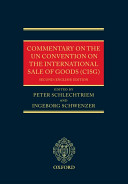
Commentary on the UN Convention on the International Sale of Goods (CISG)
By - Schlechtriem, Peter, , Schwenzer, Ingeborg H.The Convention on the International Sale of Goods is one of the most successful attempts to unify parts of the law of international commerce. The Convention is now in force in more than 60 states, and there are thousands of decisions by courts and arbitral tribunals that apply the rules of theConvention, numerous books and innumerable contributions by scholars and practitioners on the Convention and its various topics and problems. Moreover, the CISG has had a great influence on modern domestic laws, such as the Scandinavian Sales Law, the Netherlands Wetboek, the Commercial Code ofCzechia, the new German Law of Obligations and the new codifications in former Socialist states as well as on projects to unify the law, for example the UNIDROIT Principles for International Commercial Contracts and the European Principles of Contract Law. This is the second edition of the Commentary on the UN Convention on the International Sale of Goods (CISG), first published in 1998. It is based on a broad comparative analysis of decisions and scholarly contributions from all states which has enacted the Convention. The contributors to this book,all being experts in their respective fields, based their analysis on the conviction that in order to do justice to the directive of Art. 7(1) CISG that "in the interpretation of this Convention regard is to be had to its international character and to the need to promote uniformity in itsapplication", understanding and interpretation of the Convention in the light of one domestic legal system alone would be inadequate, and that, therefore, it were required to closely follow, report and compare judicial and scholarly views from all jurisdictions accessible to the contributors. Thefirst edition of this Commentary has become an important source for the reading and explanation of the Convention, and it is frequently cited by legal writers, courts and tribunals from all over the world.